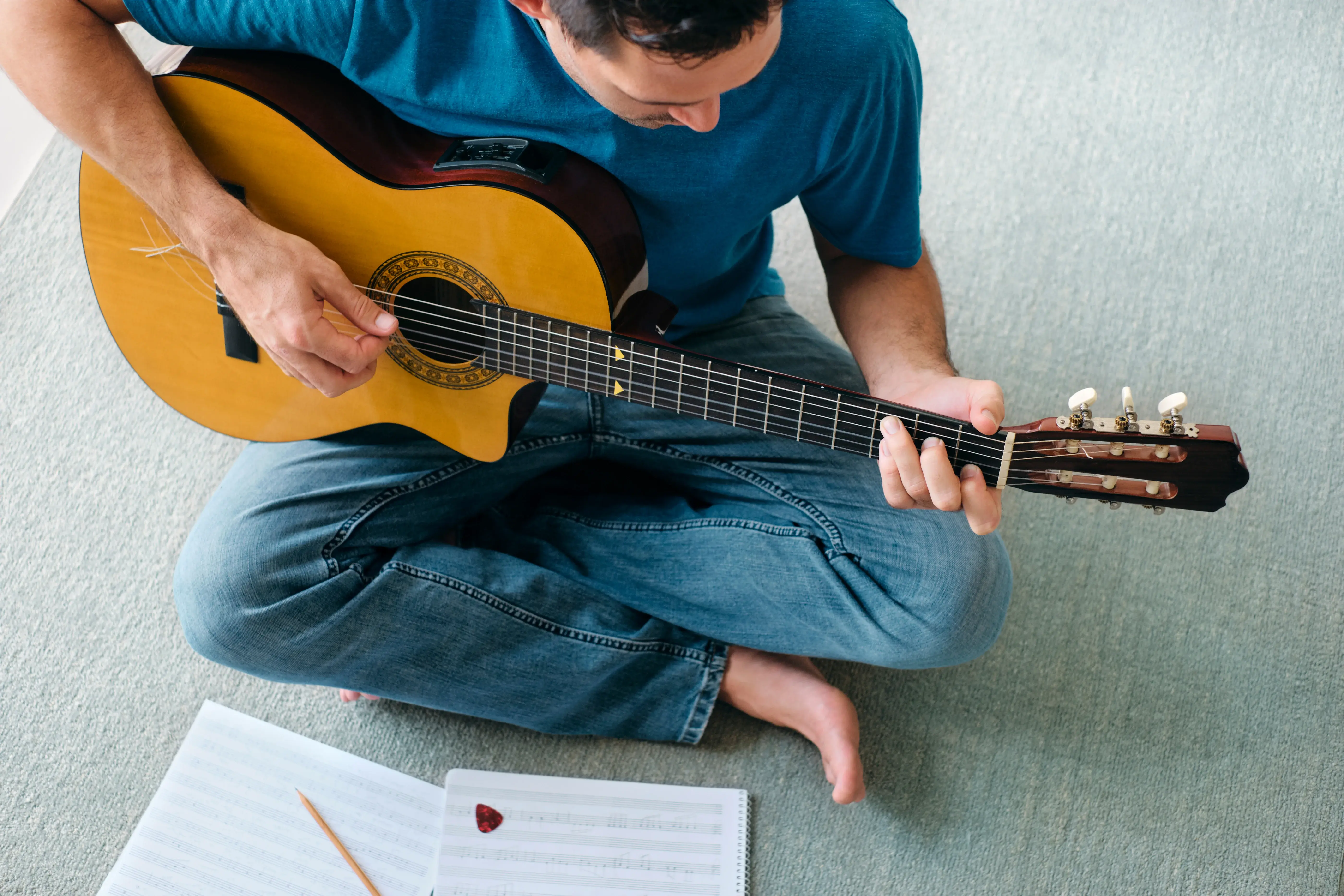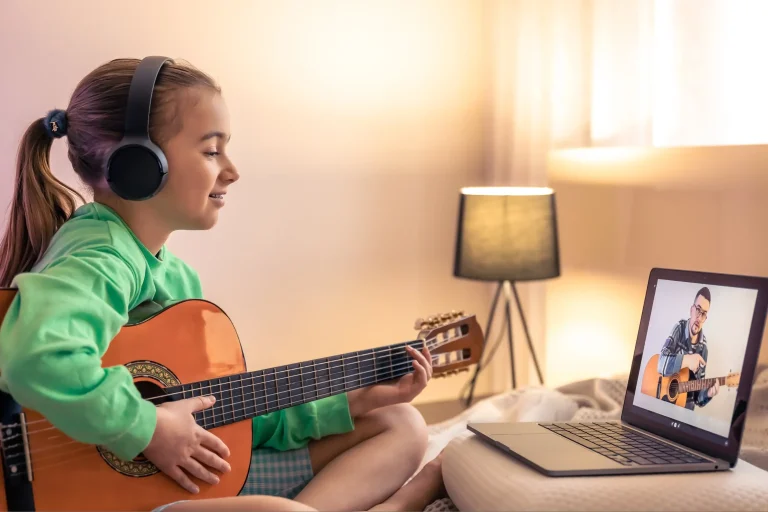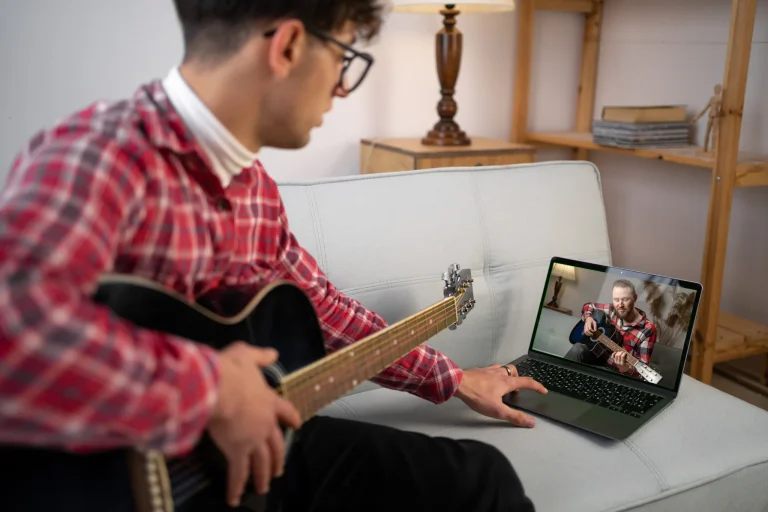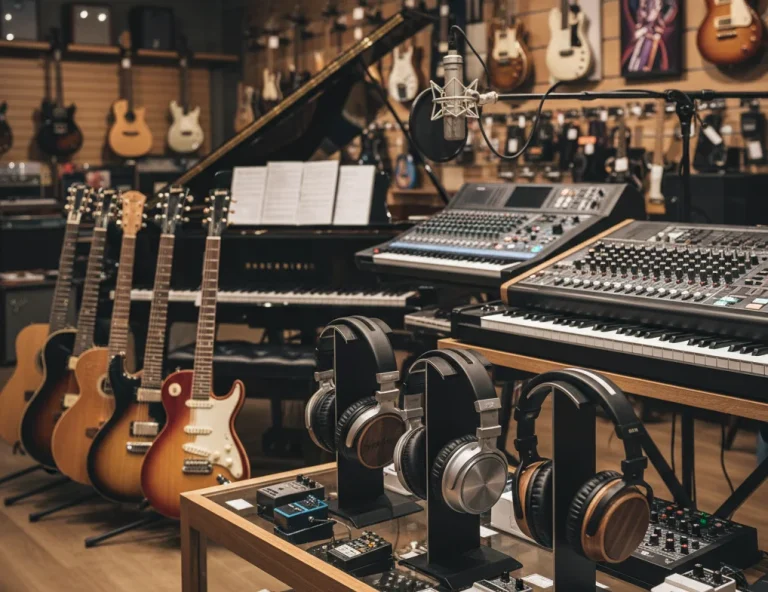All Topics
- Alchemizing Music Concepts for Students
- Artist Spotlight
- artium gift card
- Artium Maestros
- Artium News
- buying guide
- Carnatic Music
- Devotional Music
- Editorials by Ananth Vaidyanathan
- Film Music
- Guitar
- Hindustani Classical Music
- Indian Classical Music
- Indian Folk Music
- Insights
- Instruments
- Karaoke Singing
- Keyboard
- Kids Music
- maestros
- Music Education
- Music for Kids
- Music Industry
- Music Instruments
- Music Legends
- Music Theory
- Music Therapy
- Piano
- piano guide
- Success Stories
- Tamil Film Music
- Telugu Film Music
- Time Theory
- Tools
- Uncategorized
- Vocal Singing
- Vocals
- western classical music
- western music
- Western vocal music
Role of Guitar in Improving Coordination Skills
Role of Guitar in Improving Coordination Skills

Table of Contents
Playing the guitar isn’t just about making music—it’s a powerful way to enhance coordination skills. From finger dexterity to hand-eye coordination, mastering the instrument requires a unique blend of cognitive and physical synchronization.
For beginners and experienced musicians alike, learning to play the guitar helps develop fine motor skills, improve timing, and sharpen focus, so let’s dive into how playing the guitar contributes to better coordination and how it benefits both kids and adults.
But before that…
If you’re excited to begin your online guitar learning journey, start with a free trial lesson today!
Why Coordination Skills Matter
Coordination plays a crucial role in everyday tasks—from typing on a keyboard to driving a car. When it comes to playing an instrument, coordination becomes even more essential, as it involves:
- Hand independence – Playing different notes with each hand.
- Finger dexterity – Moving fingers precisely across strings.
- Timing and rhythm – Strumming in sync with beats.
- Mind-body connection – Translating musical notes into finger movements.
Mastering these skills through guitar playing strengthens neural connections in the brain, leading to improved reflexes, faster reaction times, and better multitasking abilities.
How Playing the Guitar Enhances Coordination
1. Hand-Eye Coordination
Reading sheet music, watching finger placements, and strumming simultaneously require strong hand-eye coordination. With practice, your brain learns to process visual and motor inputs faster, improving overall dexterity.
2. Finger Strength and Flexibility
Pressing guitar strings with precision enhances finger strength, agility, and flexibility. Over time, this helps with tasks requiring fine motor skills, such as writing, typing, or playing other musical instruments.
3. Left and Right Hand Independence
A guitarist must use both hands differently—one for fretting notes and the other for strumming. This split focus improves hand independence, a skill that benefits activities like playing sports or working on a keyboard.
4. Timing and Rhythm
Learning how to play guitar involves strumming in sync with beats and transitioning smoothly between chords. This enhances rhythm coordination, making it easier to dance, exercise, or engage in rhythmic tasks.
Cognitive Benefits of Playing the Guitar
Beyond physical coordination, guitar playing also boosts brain function in several ways:
- Improves memory – Learning chord progressions and song structures enhances recall abilities.
- Enhances focus and concentration – Practicing regularly strengthens attention spans.
- Encourages multitasking – Managing strumming, fretting, and listening to melodies sharpens multitasking skills.
- Reduces stress – Playing music promotes relaxation and mindfulness.
Research shows that music learners develop stronger cognitive abilities, making guitar an excellent tool for mental agility.
Guitar for Kids: Building Coordination Skills from an Early Age
Introducing online guitar lessons to kids at an early age helps them develop coordination, patience, and discipline while having fun.
Why Guitar is Great for Kids:
- Boosts motor skills – Small hands learn to stretch and strengthen muscles.
- Enhances listening skills – Helps with auditory processing and rhythm recognition.
- Encourages creativity – Kids explore musical expression through melodies and chords.
- Improves academic performance – Studies show that music education enhances math and language skills.
Tips for Parents:
- Start with a child-friendly guitar suited for small hands.
- Enroll in structured online guitar classes for step-by-step learning.
- Encourage regular practice with fun, easy songs to keep motivation high.
Looking for a beginner-friendly way to introduce your child to music? Artium Academy offers expert-led, interactive guitar lessons designed for young learners.
Guitar for Adults: Refining Coordination Skills
It’s never too late to learn guitar! Many working professionals turn to music as a way to unwind, sharpen focus, and improve dexterity.
How Adults Benefit from Guitar Playing:
- Improves finger flexibility – Keeps hands agile and strong.
- Boosts cognitive function – Strengthens memory and problem-solving skills.
- Enhances stress relief – Playing music helps in relaxation and mindfulness.
- Encourages discipline and patience – Helps develop focus in both personal and professional life.
Tips for Adult Learners:
- Set realistic practice goals to stay motivated.
- Join an online guitar course for structured learning at your own pace.
- Experiment with different genres to keep practice sessions exciting.
With Artium Academy’s expert-led online music courses, adult learners can enjoy the flexibility of learning guitar anytime, anywhere!
Techniques to Maximize Coordination Through Guitar
To improve coordination skills while learning how to play guitar, try these techniques:
- Finger exercises – Strengthen flexibility with scales and drills.
- Slow practice – Play at a slow pace before increasing speed.
- Metronome training – Helps develop steady rhythm and timing.
- Alternate picking – Enhances right-hand precision and control.
- Chord transitions – Work on smooth chord changes to improve hand coordination.
Consistent practice with these techniques makes learning guitar more effective and enjoyable.
Incorporating Guitar into Daily Life
Make guitar practice a natural part of your routine by:
- Playing short 10-minute sessions daily instead of long, infrequent ones.
- Using music as a relaxation tool after work or school.
- Playing along with favorite songs to stay motivated.
- Jamming with family or friends for a fun, social experience.
By integrating music into everyday life, learning guitar feels less like a task and more like a joyful habit.
The Science Behind Music and Coordination
Studies have shown that learning an instrument rewires the brain to strengthen connections between the left and right hemispheres. This enhances:
Motor skills – Faster hand movements and better precision.
Reaction time – Improved reflexes in day-to-day activities.
Brain plasticity – Increases adaptability and learning ability.
Neuroscientists confirm that playing an instrument like the guitar helps improve both mental and physical coordination skills!
Common Challenges and How to Overcome Them
- Struggling with finger placement? – Start with easy chord progressions and practice daily.
- Finding it hard to coordinate hands? – Slow down the pace and use a metronome for timing.
- Feeling unmotivated? – Set small, achievable goals and play songs you enjoy.
- Not enough time to practice? – Just 5-10 minutes a day can make a difference.
Overcoming these challenges makes learning guitar a rewarding and confidence-boosting experience.
Conclusion: The Power of Guitar in Coordination Development
Playing the guitar is more than a musical skill—it’s a way to enhance coordination, improve cognitive abilities, and bring joy into daily life. The guitar offers endless benefits, from helping children develop motor skills to allowing adults to refine dexterity and providing anyone with a fulfilling hobby. At Artium Academy, our expert-led online guitar classes provide a structured, engaging way to learn guitar online, making music accessible for all ages.
Start your guitar journey today and experience the joy of music while improving your coordination skills!
FAQs on Role of Guitar
Playing the guitar enhances hand-eye coordination by requiring independent movement of both hands—one for fretting notes and the other for strumming or picking, improving overall motor skills.
Yes! Regular guitar practice strengthens fingers, improves flexibility, and increases precision in movements, making it easier to play complex chords and fast melodies over time.
Absolutely! Guitar playing refines fine motor skills by engaging small muscle movements in the fingers and hands, improving control, agility, and accuracy.
Rhythm helps synchronize hand movements and timing, improving left-hand (fretting) and right-hand (strumming or picking) coordination, which is essential for smooth and accurate playing.
It varies by individual, but with consistent daily practice, beginners can see noticeable improvements in coordination and finger strength within a few months.








